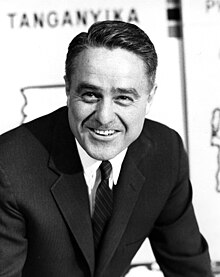
Back سارجنت شرايفر Arabic سارجنت شرايفر ARZ سارجنت شرایور AZB Sargent Shriver Czech Sargent Shriver Welsh Sargent Shriver Danish Sargent Shriver German Sargent Shriver Spanish سارجنت شرایور Persian Sargent Shriver Finnish
Sargent Shriver | |
|---|---|
 Shriver in 1961 | |
| United States Ambassador to France | |
| In office May 25, 1968 – March 25, 1970 | |
| President | Lyndon B. Johnson Richard Nixon |
| Preceded by | Charles E. Bohlen |
| Succeeded by | Arthur K. Watson |
| Director of the Office of Economic Opportunity | |
| In office October 16, 1964 – March 23, 1968 | |
| President | Lyndon B. Johnson |
| Preceded by | Position established |
| Succeeded by | Bertrand Harding |
| 1st Director of the Peace Corps | |
| In office March 22, 1961 – February 28, 1966 | |
| President | John F. Kennedy Lyndon B. Johnson |
| Preceded by | Position established |
| Succeeded by | Jack Vaughn |
| President of the Chicago Board of Education | |
| In office October 26, 1955 – October 10, 1960 | |
| Preceded by | William B. Traynor |
| Succeeded by | Thomas L. Marshall |
| Personal details | |
| Born | Robert Sargent Shriver Jr. November 9, 1915 Westminster, Maryland, U.S. |
| Died | January 18, 2011 (aged 95) Bethesda, Maryland, U.S. |
| Political party | Democratic |
| Spouse | |
| Children | |
| Relatives | Shriver family (by birth) Kennedy family (by marriage) |
| Education | Yale University (BA, LLB) |
| Signature | |
| Military service | |
| Allegiance | United States |
| Branch/service | United States Navy |
| Years of service | 1941–1945 |
| Rank | |
| Battles/wars | World War II |
| Awards | Purple Heart American Campaign Medal Asiatic–Pacific Campaign Medal World War II Victory Medal[1] |
Robert Sargent Shriver Jr. (November 9, 1915 – January 18, 2011) was an American diplomat, politician, and activist. He was a member of the Shriver family by birth, and a member of the Kennedy family through his marriage to Eunice Kennedy. Shriver was the driving force behind the creation of the Peace Corps, and founded the Job Corps, Head Start, VISTA, Upward Bound,[2] and other programs as the architect of the 1960s War on Poverty.[3] He was the Democratic Party's nominee for vice president in the 1972 presidential election.
Born in Westminster, Maryland, Shriver attended Yale University, then Yale Law School, graduating in 1941.[2] An opponent of U.S. entry into World War II, he helped establish the America First Committee but volunteered for the United States Navy before the Japanese attack on Pearl Harbor. During the war, he served in the South Pacific, participating in the Naval Battle of Guadalcanal. After being discharged from the navy, he worked as an assistant editor for Newsweek and met Eunice Kennedy, marrying her in 1953.
He worked on the 1960 presidential campaign of his brother-in-law, John F. Kennedy, and helped establish the Peace Corps after Kennedy's victory. After Kennedy's assassination, Shriver served in the administration of Lyndon B. Johnson and helped establish several anti-poverty programs as director of the Office of Economic Opportunity from October 16, 1964, to March 22, 1968.[4] He also served as the United States Ambassador to France from 1968 to 1970.[2] In 1972, Democratic vice presidential nominee Thomas Eagleton resigned from the ticket, and Shriver was chosen as his replacement. The Democratic ticket of George McGovern and Shriver lost in a landslide election defeat to Republican President Richard Nixon and Vice President Spiro Agnew. Shriver briefly sought the 1976 Democratic presidential nomination but dropped out of the race after the first set of primaries.
After leaving office, he resumed the practice of law, becoming a partner with Fried, Frank, Harris, Shriver & Jacobson. He also served as president of the Special Olympics and was briefly a part-owner of the Baltimore Orioles. He was diagnosed with Alzheimer's disease in 2003 and died in Bethesda, Maryland, in 2011.[2]
- ^ Herbert, Bob (April 23, 2004). "A Muscular Idealism". The New York Times. Retrieved December 5, 2008.
- ^ a b c d Reed, Christopher (January 19, 2011). "Sargent Shriver obituary: Brother-in-law of JFK who strove on behalf of America's poor". The Guardian. Retrieved February 22, 2021.
- ^ Cite error: The named reference
NYT-obitwas invoked but never defined (see the help page). - ^ Remarks at the Swearing In of Sargent Shriver as Director, Office of Economic Opportunity. The American Presidency Project. Retrieved 7 May 2015.